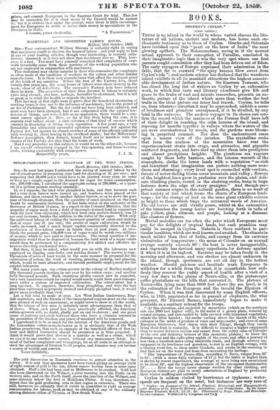MACHINERY AND SHUSTER= LAM= HOUSE.
Belfast, 18th October, 1859. Bra—Your correspondent William Stevens is certainly right in saying that machinery ought to shorten the hours of labour : and your reply to him in one of your leading articles, though very interesting, is scarcely satis- factory, inasmuch as it does not show that machinery does so. This, how- ever. is a fact. You must have yourself remarked that complaints of over- work invariably come from those portions of the working population who are not employed in conjunction with machinery.
This statement may excite surprise in those who remember the complaints so often made of the condition of workers in the cotton and other similar manufactures. It is these very manufactures that afford the strongest proof of the truth of my. assertion. Before the first of the Factory Acts, about twenty-five years ago, the usual hours of labour were about seventy in the week, clear of all deductions. The successive Factory Acts have reduced these to sixty. The proportion of time thus devoted to labour is certainly quite long enough, and may, perhaps, hereafter be shortened, butit is not so great as to crush the health or. degrade the intellect.
is fact may at first sight seem to prove that the beneficial shortening-of working hours is due, not to the influence of machinery, but to the power of an Act of Parliament. But the Act could not-have long been enforced, and must soon have been changed, had it not cooperated with the natural ten- dencies of. things, and were it felt as an oppression, there would be a con- stant outcry against it. Now, so far is this from being the case, it is scarcely ever talked about: a sure criterion of that kind of success which consists in disarming or living down opposition. A few years ago, a very formidable and ultimately successful agitation was raised, not against the Factory Act, but against an absurd crotchet of some of the officials entrusted with working it, about boxing in the overhead shafts ; but the Millowners' Defence Association, then formed, bopnd itself not to interfere with the clauses of the Factory Act that limit the hours of- work.
Had I any prejudice on this subject, it would be on the other side, because I am myself extensively engaged in the flax-spinning and linen-weaving trade, working exchuiively with steam-power. Respectfully! yours, J S. M.


























 Previous page
Previous page